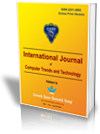An Expatiate Game-Theory Based Analysis OnMultiattacker Scenario in MANETS
 | International Journal of Computer Trends and Technology (IJCTT) |  |
| © - November Issue 2013 by IJCTT Journal | ||
| Volume-5 Issue-1 | ||
| Year of Publication : 2013 | ||
| Authors :Venkateswarlu.B , Venugopal.S. |

Venkateswarlu.B , Venugopal.S."An Expatiate Game-Theory Based Analysis OnMultiattacker Scenario in MANETS"International Journal of Computer Trends and Technology (IJCTT),V5(1):6-11 November Issue 2013 .ISSN 2231-2803.www.ijcttjournal.org. Published by Seventh Sense Research Group.
Abstract:- Nodes in Mobile Ad Hoc Network (MANET) have mobility which causes the network vulnerable to attacks. Malicious nodes can attack MANET for utility and other gains as they have ability to move. Regular node sin the network has certain strategies towards their functionality and security. In the same fashion, malicious nodes must be having their own strategies to make attacks on the network. It is important to analyze the profiles of both kinds of nodes. Recently Li et al. proposed a framework that analyzes interactions among the nodes in Mobile Ad Hoc Network in order to secure the network from malicious access. Their solution is based on game theory. Regular nodes update their security aspects based on the malicious nodes and their behavior. In the same manner the malicious nodes also think about the risk of being caught. They also think about when to flee to avoid the risk. In this paper we practically implement the proposed game theory. We built a prototype application to simulate the MANET scenario that analyzes interactions among the nodes. The empirical results revealed that the proposed framework is useful.
References -
[1] M. Felegyhazi, J. Hubaux, and L. Buttyan, “Nash equilibria of packet forwarding strategies in wireless ad hoc networks,” IEEE Trans. MobileComput., vol. 5, no. 5, pp. 463–476, May 2006.
[2] L. Buttyan and J. Hubaux, “Stimulating cooperation in self-organizing mobile ad hoc networks,” ACM Mobile Netw. Appl., vol. 8, no. 5, pp. 579– 592, Oct. 2003.
[3] A. Blanc, Y. Liu, and A. Vahdat, “Designing incentives for peer-to-peer routing,” in Proc. IEEE INFOCOM, 2005, pp. 374–385.
[4] G. Theodorakopoulos and J. Baras, “Malicious users in unstructured networks,” in Proc. IEEE INFOCOM, 2007, pp. 884–891.
[5] P. Liu, W. Zang, and M. Yu, “Incentive-based modeling and inference of attacker intent, objectives and strategies,” ACM Trans. Inf. Syst. Secur., vol. 8, no. 1, pp. 78–118, Feb. 2005.
[6] S. Sarkar, E. Altman, R. El-Azouzi, and Y. Hayel, “Information concealing games,” in Proc. IEEE INFOCOM, 2008, pp. 2119–2127.
[7] S. Ng and W. Seah, “Game-theoretic model for collaborative protocols in selfish, tariff-free, multihop wireless networks,” in Proc. IEEEINFOCOM, 2008, pp. 216–220.
[8] P. Nuggehalli, M. Sarkar, K. Kulkarni, and R. Rao, “A game-theoretic analysis of QoS in wireless MAC,” in Proc. IEEE INFOCOM, 2008, pp. 1903–1911.
[9] L. Chen and J. Leneutre, “Selfishness, not always a nightmare: Modeling selfish MAC behaviors in wireless mobile ad hoc networks,” in Proc.IEEE ICDCS, 2007, p. 16.
[10] X. Liu, G. Noubir, R. Sundaram, and S. Tan, “SPREAD: Foiling smart jammers using multi-layer agility,” in Proc. IEEE INFOCOM, 2007, pp. 2536–2540.
[11] Y. Liu, C. Comaniciu, and H. Man, “A Bayesian game approach for intrusion detection in wireless ad hoc networks,” in Proc. ACM GameNets, 2006, p. 4.
[13] S. Bansal and M. Baker, “Observation-based cooperation enforcement in ad hoc networks,” Stanford Univ. Press, Stanford, CA, Tech. Rep. (CoRR cs.NI/0307012), 2003.
[14] S. Buchegger and J. Boudec, “Performance analysis of the confidant protocol,” in Proc. ACM MobiHoc, 2002, pp. 226–236.
[15] P. Michiardi and R. Molva, “CORE: A collaborative reputation mechanism to enforce node cooperation in mobile ad hoc networks,” in Proc.Commun. Multimedia Secur., 2002, pp. 107–121.
[16] S. Buchegger and J. Boudec, “A robust reputation system for P2P and mobile ad-hoc networks,” in Proc. 2nd Workshop Econ. Peer-to-PeerSyst., 2004, pp. 403–410.
[17] F. Li, A. Srinivasan, M. Lu, and J. Wu, “Uncertainty mitigation for utility-oriented routing in MANETs,” in Proc. IEEE GLOBECOM, 2007, pp. 427–431.
[18] A. Josang, R. Ismail, and C. Boyd, “A survey of trust and reputation systems for online service provision,” Decis. Support Syst., vol. 43, no. 2, pp. 618–644, Mar. 2007.
[19] F. Li and J. Wu, “Mobility reduces uncertainty in MANETs,” in Proc. IEEE INFOCOM, 2007, pp. 1946–1954.
[20] V. Srinivasan, P. Nuggehalli, C. Chiasserini, and R. Rao, “Cooperation in wireless ad hoc networks,” in Proc. IEEE INFOCOM, 2003, pp. 808–817.
[21] Feng Li, Yinying Yang, and Jie Wu, “Attack and Flee: Game-Theory-Based Analysis on Interactions Among Nodes in MANETs”. IEEE TRANSACTIONS ON SYSTEMS, MAN, AND CYBERNETICS—PART B: CYBERNETICS, VOL. 40, NO. 3, JUNE 2010.
Keywords :— MANET, game theory, attack, flee, security
